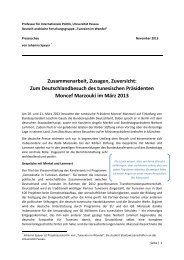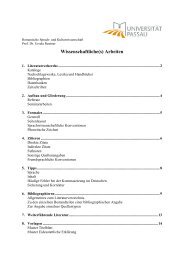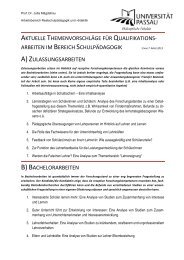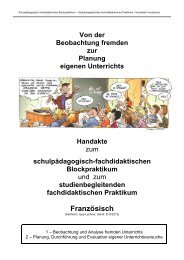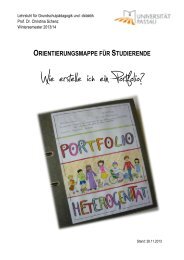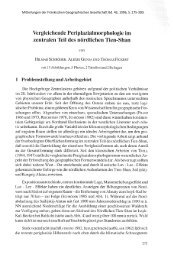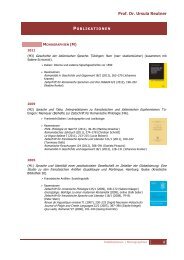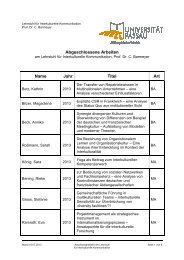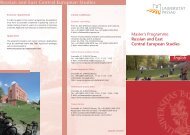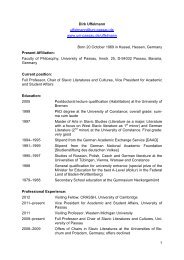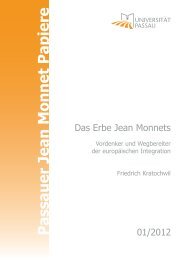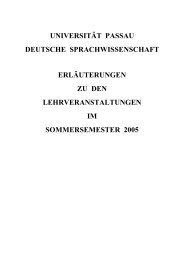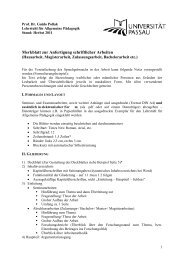The attempt to adopt a mixed-member proportional election system ...
The attempt to adopt a mixed-member proportional election system ...
The attempt to adopt a mixed-member proportional election system ...
You also want an ePaper? Increase the reach of your titles
YUMPU automatically turns print PDFs into web optimized ePapers that Google loves.
54<br />
writing, he was the dean of the faculty of economics, Chiang Mai University, besides<br />
sitting on a number of academic committees. Pisit’s doc<strong>to</strong>ral dissertation at Erasmus<br />
Universiteit Rotterdam was published as From Crisis <strong>to</strong> Double Digit Growth. Thailand's<br />
Economic Adjustment in the 1980s. Bangkok: Dokya Publishing House, 1991.<br />
He was also the president of the Netherlands-Thai chamber of commerce, and chairperson<br />
of Jardines Matheson (Thailand) Ltd., and many other state and private enterprises.<br />
His socio-political circles included Prem Tinsulanonda, Surayud Chulanond,<br />
Anand Panyarachun, Sanoh Unakul, Borwornsak Uwanno, and Visanu Kruangarm. In<br />
sum, Pisit was a good example of the technocratic section of the aphichon.<br />
19 Vicha was a former chief justice of the Supreme Court’s juvenile and family division.<br />
At the time of the CDC, he served on the National Anti-Corruption Commission<br />
(appointed by a decree issued by the coup plotters in September 2006). In 2006, he<br />
was a candidate <strong>to</strong> the ECT, but was not selected (reportedly because the Thaksin<br />
government considered him hostile, similar <strong>to</strong> Kaewsan Atipho and Nam Yimyaem,<br />
both of whom later served on the military-appointed anti-Thaksin Asset Scrutiny<br />
Committee). He was on the judiciary’s side in its post-April 2006 fight against the<br />
supposedly pro-Thaksin ECT arguing that, “<strong>The</strong> judges are trying <strong>to</strong> protect our democracy<br />
and our political <strong>system</strong>…” He was in class 41 at the National Defense College,<br />
a key institution for the social and ideological reproduction of the aphichon or<br />
ammat. Vicha headed a number of charities, partly under royal patronage. When extremist<br />
right-winger Thanin Kraivichien was prime minister, after the massacre at<br />
Thammasat University in Oc<strong>to</strong>ber 1976, Vicha was his personal secretary. He also coauthored<br />
a book on the interpretation of law with him.<br />
20 A medical doc<strong>to</strong>r by training, Chuchai was a former secretary general of the National<br />
Human Rights Commission, before a conflict with the NHRC’s thenchairperson,<br />
Saneh Chamarik, cost him his job. During the CDC, Chuchai served as a<br />
high-ranking advisor <strong>to</strong> the office of the NHRC. He was later reappointed <strong>to</strong> his previous<br />
position, only <strong>to</strong> be dismissed again by the second set of human rights commissioners.<br />
21 Komsan used <strong>to</strong> work for the Election Commission of Thailand immediately after it<br />
was established (at that time, I met him a number of times, because I collected data on<br />
the ECT). At the time of the CDC, he was a lecturer in the faculty of law at Sukhothai<br />
Thammathirat University. He was one of the more junior <strong>member</strong>s on the CDC. Komsan<br />
was later described by the critical blog “Thai Political Prisoners” as an “ultraroyalist<br />
and yellow shirt” (Thai Political Prisoners 2012). This assessment was based<br />
on his <strong>member</strong>ship in a far-right political group, called “Sayam Prachaphiwat.” During<br />
the PAD protests in early 2006, he was amongst a group of 96 academics that petitioned<br />
the king on March 4 <strong>to</strong> replace Prime Minister Thaksin Shinawatra by an interim<br />
premier (<strong>The</strong> Nation, March 5, 2006).<br />
22 At the time of the CDC, Nakharin was dean of the faculty of political science at<br />
Thammasat University. He was a key <strong>member</strong> of a closely-knit and long-standing<br />
academic-political phuak (informal clique), of which Somkit Lertpaithoon, the secretary<br />
of the CDC, was a another key <strong>member</strong>, while Noranit Sethabutr (the group’s<br />
most senior <strong>member</strong> and leader, a former lecturer at the faculty of political science of<br />
Thammasat University, a former president of this university, a former secretary general<br />
of the King Prajadhipok Institute, and the current president of Thammasat Uni-



